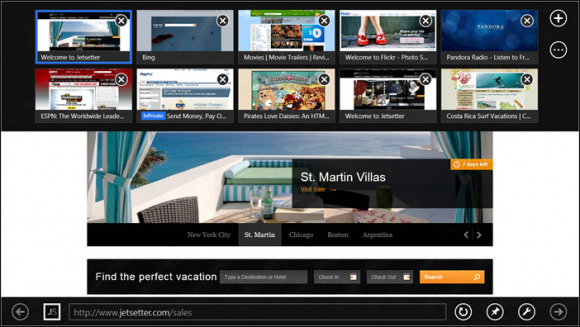Google and Mozilla blast Windows 8 browser bias
Microsoft is under fire from Google and Mozilla, accused of anti-competitive practices with the special version of Windows 8 for ARM-based notebooks and tablets. Windows RT, the OS Microsoft hopes will help its OEM partners better challenge Apple's iPad, pushes the Metro interface rather than the relatively locked-down Windows Classic desktop, with browsers like Firefox and Chrome only allowed to run in the former. That, Mozilla argues – with Google soon wading in afterward – is unfair, especially as Microsoft will have a Classic version of Internet Explorer.
"The prospect that the next generation of Windows on ARM devices would limit users to one browser is untenable and represents a first step toward a new platform lock-in" Mozilla general counsel Harvey Anderson wrote on the company blog. Although he concedes that Windows RT devices will be in the minority at the start, Microsoft's ambitions for the platform indicate this could be a barrier that becomes increasingly important for third-party developers.
"On ARM chips, Microsoft gives IE access special APIs absolutely necessary for building a modern browser that it won't give to other browsers so there's no way another browser can possibly compete with IE in terms of features or performance" Mozilla spokesperson Asa Dotzler explained. The issue is that only Classic apps get full access to all of the APIs the OS offers; Metro apps must make do with a smaller subset. "IE on ARM has access to win32 APIs — even when it's running in Metro mode, but no other Metro browser has that same access" Dotzler elaborates. "Without that access, no other browser has a prayer of being competitive with IE."
The Firefox team has already committed to creating a Metro version, but Microsoft's app decision has now woken up Google's Chrome team, which echoes Mozilla's fears. Like Mozilla, Google frames it as a consumer rights issue, telling CNET that Microsoft's IE strategy damages user-experience and security on future Windows RT devices.

"We share the concerns Mozilla has raised regarding the Windows 8 environment restricting user choice and innovation" a Google spokesperson said. "We've always welcomed innovation in the browser space across all platforms and strongly believe that having great competitors makes us all work harder. In the end, consumers and developers benefit the most from robust competition."
The danger for Microsoft is that regulators begin to examine its decisions in the light of anti-competition laws, something the company already knows plenty about. For actual users of Windows RT, however, it's arguable that they'd be better served by the removal of the Windows RT Classic desktop altogether, something that seems to have lingered only by virtue of Microsoft Office and the absence of a true Metro version of the business app package.
Microsoft's Steven Sinofsky referenced the limitations of third-party apps transitioning from x86 to ARM-based Windows systems in a blog post back in February. His argument is that porting existing software to Windows RT tablets and notebooks basically amounts to lazy developing, bringing just as many compromises and drawbacks for users as it does convenience for developers:
"If we enabled the broad porting of existing code we would fail to deliver on our commitment to longer battery life, predictable performance, and especially a reliable experience over time. The conventions used by today's Windows apps do not necessarily provide this ... By avoiding these constructs, WOA can deliver on a new level of customer satisfaction: your WOA PC will continue to perform well over time as apps are isolated from the system and each other, and you will remain in control of what additional software is running on your behalf, all while letting the capabilities of diverse hardware shine through"
Windows RT, unlike Windows 8, is designed to be almost entirely used through the Metro UI – that, after all, is the best way to challenge the iPad and Android-based tablets, with a focused, finger-friendly interface – and encouraging users to switch out of that into the familiar old desktop seems backward. Unfortunately, Microsoft's own tardiness with Office and the accommodations it has had to make to deal with that could well come back to haunt it.
